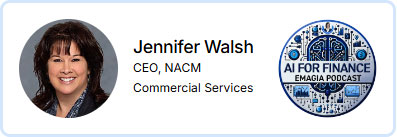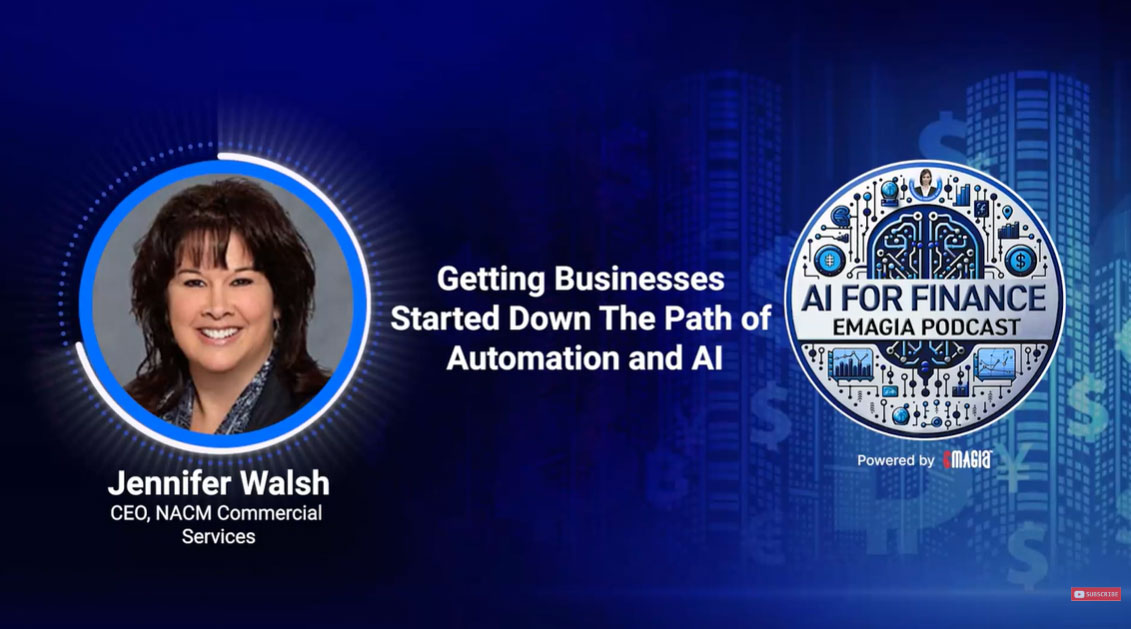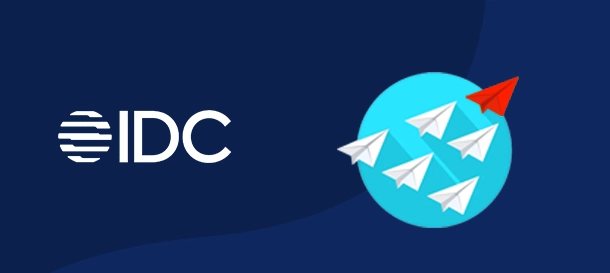A recent episode of the Emagia AI For Finance podcast series

Starting Down the Path of Automation and AI
“In every conversation we have today, the topic of automation inevitably comes up.”
The use of automation and AI in business and finance has gone from a taboo topic in B2B credit years ago to the trend everyone wants to know more about, according to Jennifer Walsh, CEO of the National Association of Credit Management (NACM) Commercial Services affiliate.
In a recent episode of the Emagia AI Finance podcast, Walsh spoke about how credit departments of wildly varying sizes and levels of expertise are approaching the early stages of AI and autonomous finance adoption. Like so many, she saw 2023 as a marked turning point in how companies are approaching AI in the western states covered by NACM Commercial Services and beyond.
“Everyone is now willing to talk about AI and explore how it can improve their business,” said Walsh, a 25-year business credit veteran. And while initial resistance existed in areas like credit applications, the conversation has shifted, and automation is now a central topic for credit professionals.
That said, Walsh noted caution remains embedded in the credit profession’s DNA, which is leading to slow adoption and implementation in some quarters.
“Credit professionals, by their nature, are trained to be more cautious than their counterparts in sales or marketing,” she said. “They have to protect the data they gather on debtors and make prudent credit decisions.”
The Importance of Education
Walsh emphasized that education is crucial for professionals as they navigate AI and automation.
“We’ve taken an early stance that educating credit professionals—and our own staff—about AI opportunities and risks is key,” she said.
NACM has brought in legal experts to train staff and developed educational programs focused on AI for its members. Walsh has seen significant demand for education.
“It’s encouraging to see how many national and regional groups are asking for more AI training. Everyone wants to understand how it can improve their jobs,” she added.
Digital Assistants: Enhancing, Not Replacing
With cautiousness comes the need for clarity on how AI will integrate into daily workflows. Walsh advises companies to communicate their stance on AI clearly to their teams. This helps set boundaries and ensures that employees understand the scope of the technology’s capabilities.
While platforms like ChatGPT are gaining popularity, Walsh stresses the importance of independent decision-making in the credit field. GiaGPT, Emagia’s AI solution, differs from ChatGPT by only utilizing data provided by the user in a closed-cloud environment., without tapping into public information on the greater Internet. Closed-cloud solutions can give credit professionals more peace of mind in using it, assuming their own data is clean and reliable.
Walsh notes the increasing interest in AI-based digital assistants (or copilots) that can significantly reduce the time spent on routine tasks, allowing credit professionals to focus on more strategic work.
“It’s a gift to credit teams—saving time on mundane tasks so they can focus on what truly matters,” Walsh said.
Achieving Everyday Success
Walsh encourages professionals to begin exploring AI by applying it to everyday tasks. From writing collection letters to performing public record research, AI can enhance efficiency in small but meaningful ways.
“A successful outcome is for a credit person’s routine tasks to become easier so they can spend more time improving cash flow and collaborating with sales and the C-suite,” Walsh said. She believes that AI can help credit professionals become more integral to their companies’ strategic goals.
Paving the Path to Acceptance
AI has quickly become the hottest discussed trend in business circles for the last two calendar years. Still, adoption and implementation are not happening overnight, Walsh acknowledged.
“I see AI as a tool that will allow credit teams to do more with less, (but) some industries are going to be quicker to adopt than others,” she observed.
Comparing AI’s growth to Google’s rise in the early 2000s, Walsh expressed optimism about AI’s trajectory.
“A year from now, it will be exciting to see how far AI has come and how companies are leveraging it.”
FAQs:
What is NACM? The National Association of Credit Management (NACM) was founded in 1896 and works to promote responsible commercial credit practices by providing education, advocacy, and support for credit professionals. Emagia is a preferred partner of NACM, and members of our senior staff have served in the capacity of exhibitors and expert speakers at various NACM events including its annual Credit Congress & Expo.
What is ChatGPT? ChatGPT, developed by OpenAI, is a chatbot that generates text-based responses and provides assistance across various topics. It became one of the fastest-growing consumer applications, thanks to its ability to engage in complex conversations and offer real-time insights.
What is Emagia’s GiaGPT? A 2023 offshoot of Emagia’s proprietary digital assistant Gia that was originally launched in 2018, GiaGPT is Emagia’s AI-powered digital assistant designed to streamline finance operations by offering fast, actionable insights through natural language interactions. It provides finance leaders with visual data analysis based on documents the user decides to upload rather than public information on the Internet. GiaGPT supports faster, data-driven decision-making.
Getting Started with AI:
Establish an internal AI policy to define boundaries and set clear expectations.
Start with initial applications like:
- Public record research
- Drafting collection letters
- Improving writing styles
- Formulating collection policies









